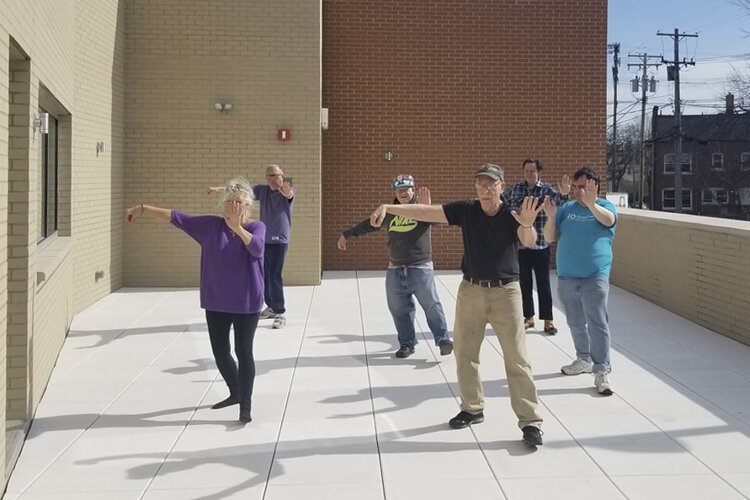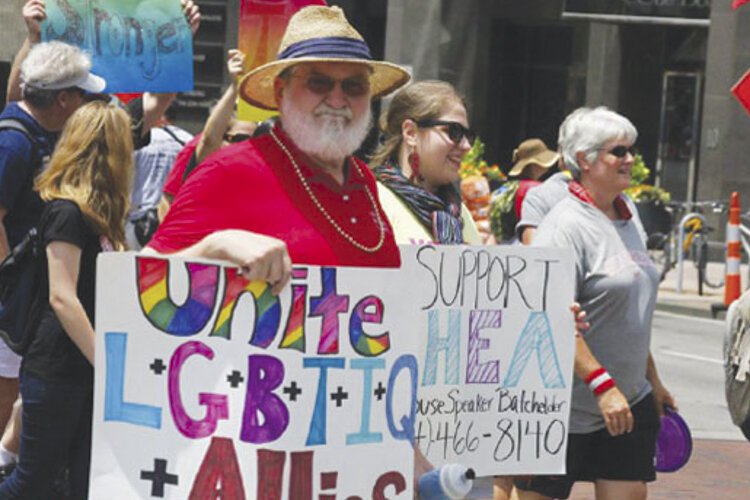How Ohio organizations are supporting LGBTQ+ elders during the pandemic
When COVID-19 began to rage across the land, the warning bells quickly rang out loud and clear: we must be extra careful around our senior citizens.
With the evidence pointing towards disproportionately more serious health risks for this population, elder care facilities were placed on lockdown and seniors were generally advised to stay inside and limit contact with everyone around them, including friends and family. For most seniors, video chats and phone calls allowed them to maintain connections and some sense of normalcy.
 But for many older LGBTQ+ adults, these lifelines simply have not been available.
But for many older LGBTQ+ adults, these lifelines simply have not been available.
According to SAGE (Services and Advocacy for LGBT Elders), LGBTQ+ seniors are twice as likely to be single and live alone, and four times less likely to have adult children than their straight counterparts.
The result? This group is especially isolated during normal times and even more so during a global pandemic.
In Ohio, several LGBTQ+ organizations have devised creative strategies to not only engage this vulnerable population, but keep them healthy during COVID-19, the second pandemic in these seniors’ lifetime.
“These are people who survived the AIDS crisis and other challenges, but this was a brand new challenge for four generations of us who have never lived through anything like this,” says Mary Beth Bartholomew, the SAGE program activities coordinator at the LGBT Community Center of Greater Cleveland.
The center began offering senior programming in 2003 and became a SAGE affiliate in 2013—the only SAGE affiliate in Ohio. SAGE’s 2020 Annual Report outlines several senior outreach programs implemented during the pandemic, including box lunches, grocery delivery, and access to tablets and hot spots made possible by a donation from the National Council of Jewish Women Cleveland. The programming for seniors at SAGE not only supports a sense of community among the isolated, but sometimes means the difference between hunger and a meal.
 “Pre-COVID, we used to serve meals twice a week, and for some folks that was their main meal of the day,” explains Bartholomew. “We also do a lot of outreach to folks who might not be able to make it into the [SAGE] Center, so we help with transportation.”
“Pre-COVID, we used to serve meals twice a week, and for some folks that was their main meal of the day,” explains Bartholomew. “We also do a lot of outreach to folks who might not be able to make it into the [SAGE] Center, so we help with transportation.”
These meals became box lunches during the pandemic, and the new grocery delivery program helps provide food for seniors both to avoid the risks of public interaction and to provide food to those without access to transportation.
“People are talking about depression and fatigue and stress, just from having endured the past 14 months,” says Bartholomew. “Isolation is the biggest issue. Some of them have no one.”
To address the isolation, roughly 45 volunteers have been making regular calls to connect with SAGE members who live alone, especially those who don’t have internet access or don’t enjoy virtual meetings.
Participation Variance
Even with SAGE Cleveland offering virtual programming three times per week, Bartholomew reports always seeing the same handful of participants—missing a large number of seniors who were more active during in-person activities. This is where those volunteer calls and other low-tech programs have helped, including an intergenerational pen pal program.
Though SAGE Cleveland recently reopened for in-person meetings in the first week of May, Stonewall Columbus continues to operate their programs virtually. Zac Boyer, Stonewall’s manager of programs and outreach, has been fielding phone calls asking when Stonewall will open back up, as the effects of isolation and loneliness continue to affect older adults in the LGBTQ community.
“It’s hard to plan events when you don’t know when it will be safe again to meet in person,” explains Boyer. “We have to factor in everyone’s health and safety.”
Stonewall’s Trailblazers program for members aged 50+ started in 2012 thanks to a grant from the Legacy Fund. Before Covid, the Trailblazers held activities from monthly meetups to social events at local theaters and museums. During the pandemic, Boyer helped create a Zoom guide to help Trailblazers understand which applications are safe to download, which then helped the group transition to a monthly Zoom meeting.
Though both organizations do their best to include as many people as possible in programs, virtual programming does come with a level of exclusion—internet access, savviness at using tech, and Zoom burnout affect the community at all ages, and especially elderly members.
And while LGBTQ+ seniors on the whole are more likely to live in poverty, those who are transgender, Black, and/or disabled face increasing challenges when it comes to secure access to housing, food, healthcare, transportation, internet, and more. It is a reality about which both LGBTQ+ organizations are keenly aware and take strides to address.
“The [SAGE] group is predominantly cis and white, and it’s hard [for people of color]to break into the space,” says Bartholomew. “We have to really let [all seniors] know that we want them to be with us, that they are safe and welcome.”
Indeed, though the Cleveland LGBT Center and Stonewall Columbus serve majority white, cis senior communities, both have initiatives in motion to diversify their membership.
“Trailblazers has had a core group that is mostly cis and socioeconomically well-off. I’m trying to gently nudge us toward greater inclusion,” explains Boyer. “Though there’s a core group of people representing one experience, when we look at the identities represented in the room, we have to be critical about who isn’t at the table.”
Diminishing Funds
Some of the services put in place at the start of the pandemic to help our seniors are drying up. With grant money running out and community donations slowing down, we risk putting our senior community back out of sight and out of mind.
When asked how the local community could help support SAGE, Bartholomew said, “Donations always help us provide programming, meals, and transportation.”
Volunteering time helps ensure that outreach programs can continue even after the pandemic is over. At Stonewall Columbus, interested volunteers can specify that they’d like to support the Trailblazers program specifically, though in person activities are still limited. Stonewall is also eager to connect with other Columbus organizations and groups to provide programming for the Trailblazers.
Boyer also points out the importance of donations, saying “Membership dollars directly support programming.” Different membership levels are explained on the Stonewall Columbus website, or you can make a one-time donation as well.”
In this season of Pride celebrations, the desire to get outside and see each other will be stronger than ever. As we exchange hugs here in Ohio, we must remember our LGBTQ+ elders. Without them, we wouldn’t have Pride, and they need us now more than ever.
Published with permission from The Buckeye Flame. This story originally appeared as part of Amplify Ohio, a collaborative with The Buckeye Flame, Black Girl Media, and ColumbusBlack.com, and sponsored by Local Media Association.
Caitlin Fisher is a queer, non-binary writer in Cleveland, author of The Gaslighting of the Millennial Generation, and prone to random acts of pep talk. She is also the host of the podcast Run Like Hell Toward Happy, a show that helps overwhelmed creatives achieve their goals without burnout.

